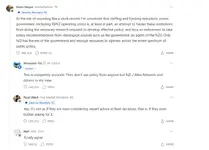No, those are the attributes that drive profit, greed and power into the hands of the few already wealthy, and fuck the rest of us over.‘At its core, neoliberliasm emphasizes free markets, limited government intervention, and individual responsibility as the best way to organize society.’
Those are the attributes that have driven the competition that we have all benefitted from. Capitalism is stunted without it!
As I said, examples of other countries where different systems have worked
Different systems to neoliberalism? And as I said, anywhere that bog standard equitable capitalism is applied with fairness in any society. Many european countries fulfil this criteria.
You're a neolib Wiz. It's your lifeblood. You worship "There is no alternative".

